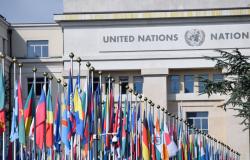Why Human Rights Offer a Stronger Case for a Cease-Fire in Gaza

Robert Diab argues that we need to change the framing to protect civilians in Gaza.
In 1949, Hannah Arendt, who had recently fled from Nazi Germany, pointed out a paradox at the heart of human rights we’ve never been able to resolve.
When the United Nations voted to adopt the Universal Declaration of Human Rights in 1948, its goal was to protect something human, even sacred, after everything has been stripped away from a person — citizenship, legal status, property.
The UN proclaimed that we all have certain basic rights that could not be taken away. The right to life, liberty, and security of the person. In asserting that we are “born free and equal in dignity and rights”, it affirmed the supreme moral value of human life itself.
The problem, Arendt pointed out, is that one could only have these basic rights if a government were prepared to uphold them. Yet a state would do this only if one already belonged to it. If you were already a citizen, with legal rights, and safely situated within its borders.
The human rights you were accorded as a stateless refugee were thus real only if you were no longer a stateless refugee.
As we approach the 75th anniversary of the UN Declaration, bombs have been dropping on Gaza killing, at one point, hundreds of children a day. There have been calls for a ‘humanitarian pause’ in hostilities. But notably absent from the debate has been overt mention of the ‘human rights’ of the people of Gaza.
Arendt’s paradox helps to explain the absence of the language of human rights in the conflict. But the failure to invoke basic rights takes away from government and NGOs an important tool for advocating for a cease-fire—a potentially more effective tool than calls for a ‘humanitarian pause.’
Israelis massacred by Hamas also suffered a gross violation of basic rights, but for many in Israel, this fact points to a failure on the part Israel’s military. The mass slaughter of Palestinians fails to be a violation of basic rights because no state is willing to recognize it as such.
In the absence of rights, the plight of innocent Gazans is effectively captured in the terminology of an Italian philosopher, Giorgio Agamben, who took his inspiration from the work of Hannah Arendt. Agamben argued that one of the more subtle forms of power central to modern government — democratic or totalitarian — is the creation of what he calls ‘bare life.’
Governments wield power by declaring certain people outlaws, stripping them of all protections, and reducing them to bare existence. Nazis did this to Jews in the camps. Modern states do this by placing migrants in indefinite detention. Israel, Agamben would suggest, is doing this by cutting off fuel and supplies to Gaza and trapping people within it.
In their understandable rage and grief, Israel’s leaders have refused to distinguish between innocent civilians and terrorists. There is seemingly no number of women and children too large to sacrifice in the pursuit of a single combatant. For Israel’s commanders, the fault lies with Hamas for choosing to hide in certain places. If anyone has reduced Palestinians to bare life, they assert, it wasn’t us.
The fact, however, is that Gazans have been stripped of basic rights and reduced to bare life. Yet the way the conflict has been framed thus far diverts our attention from this. Framed around the laws of war, debate over the bombing of hospitals, schools, and crowded refugee camps in Gaza has become mired in questions of proportionality in self-defence.
Talk of ‘humanitarian pauses’ only adds to this problem by affirming the laws of war as the best way to approach the conflict.
But to get past the current impasse, to make a stronger argument for a cease-fire, we need to change the frame. We need to invoke human rights.
Casualties on both sides of the conflict reflect a similar inhumanity, a failure to value the equal “dignity and worth” of civilian lives. The conflict is not about self-defence primarily but about the triumph of tribalism and the reduction of the other party to “human animals”. Using the language of human rights would expose this devaluation of life and foreground it, making it harder to justify further mass civilian casualties.
Some might argue that the marked absence of the language of human rights during the conflict in Gaza shows that as an ideal, it is long dead. The 75th anniversary of the UN’s Universal Declaration in December will come and go without fanfare. Gaza, the Ukraine, and Syria all reveal the grim reality that nothing can shield us from the possibility of being reduced to bare life. There is no way to preserve basic rights, and therefore no point in asserting them.
But ideas never die. Paradoxical or not, the idea of human rights is to be found everywhere one looks in this conflict. We can’t bear witness to the killing without dismay if not horror, because we take for granted that human life is valuable. That we are born “free and equal in dignity” — if not in rights.
Arendt outlined a paradox about human rights but understood the force of their idea. As Arendt once did, we might lament the failure to protect rights. But she might have agreed that we have few ideas as powerful for condemning the slaughter of innocents.
Robert Diab is Professor in the Faculty of Law, Thompson Rivers University. Robert’s research interests are in constitutional rights, legal theory, and topics in law and technology. He is the author of Search and Seizure (in Irwin’s Essentials of Canadian Law series, with C. Hunt) (2023); The Harbinger Theory: How the Post-9/11 Emergency Became Permanent and the Case for Reform (Oxford UP, 2015); and Guantanamo North (Fernwood, 2008). He has also written extensively about police powers, including a report for the Public Order Emergency Commission in 2022 on the use of the federal Emergencies Act.
Photo by Xabi Oregi
